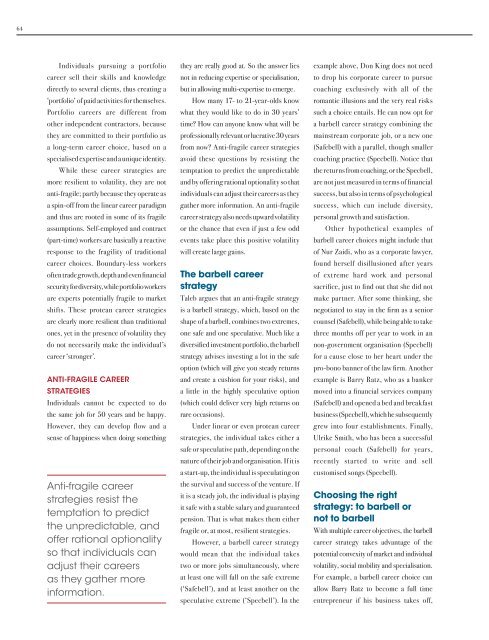SMU_AMI_November_Spread
You also want an ePaper? Increase the reach of your titles
YUMPU automatically turns print PDFs into web optimized ePapers that Google loves.
64<br />
Individuals pursuing a portfolio<br />
career sell their skills and knowledge<br />
directly to several clients, thus creating a<br />
‘portfolio’ of paid activities for themselves.<br />
Portfolio careers are different from<br />
other independent contractors, because<br />
they are committed to their portfolio as<br />
a long-term career choice, based on a<br />
specialised expertise and a unique identity.<br />
While these career strategies are<br />
more resilient to volatility, they are not<br />
anti-fragile; partly because they operate as<br />
a spin-off from the linear career paradigm<br />
and thus are rooted in some of its fragile<br />
assumptions. Self-employed and contract<br />
(part-time) workers are basically a reactive<br />
response to the fragility of traditional<br />
career choices. Boundary-less workers<br />
often trade growth, depth and even financial<br />
security for diversity, while portfolio workers<br />
are experts potentially fragile to market<br />
shifts. These protean career strategies<br />
are clearly more resilient than traditional<br />
ones, yet in the presence of volatility they<br />
do not necessarily make the individual’s<br />
career ‘stronger’.<br />
Anti-fragile career<br />
strategies<br />
Individuals cannot be expected to do<br />
the same job for 50 years and be happy.<br />
However, they can develop flow and a<br />
sense of happiness when doing something<br />
Anti-fragile career<br />
strategies resist the<br />
temptation to predict<br />
the unpredictable, and<br />
offer rational optionality<br />
so that individuals can<br />
adjust their careers<br />
as they gather more<br />
information.<br />
they are really good at. So the answer lies<br />
not in reducing expertise or specialisation,<br />
but in allowing multi-expertise to emerge.<br />
How many 17- to 21-year-olds know<br />
what they would like to do in 30 years’<br />
time? How can anyone know what will be<br />
professionally relevant or lucrative 30 years<br />
from now? Anti-fragile career strategies<br />
avoid these questions by resisting the<br />
temptation to predict the unpredictable<br />
and by offering rational optionality so that<br />
individuals can adjust their careers as they<br />
gather more information. An anti-fragile<br />
career strategy also needs upward volatility<br />
or the chance that even if just a few odd<br />
events take place this positive volatility<br />
will create large gains.<br />
The barbell career<br />
strategy<br />
Taleb argues that an anti-fragile strategy<br />
is a barbell strategy, which, based on the<br />
shape of a barbell, combines two extremes,<br />
one safe and one speculative. Much like a<br />
diversified investment portfolio, the barbell<br />
strategy advises investing a lot in the safe<br />
option (which will give you steady returns<br />
and create a cushion for your risks), and<br />
a little in the highly speculative option<br />
(which could deliver very high returns on<br />
rare occasions).<br />
Under linear or even protean career<br />
strategies, the individual takes either a<br />
safe or speculative path, depending on the<br />
nature of their job and organisation. If it is<br />
a start-up, the individual is speculating on<br />
the survival and success of the venture. If<br />
it is a steady job, the individual is playing<br />
it safe with a stable salary and guaranteed<br />
pension. That is what makes them either<br />
fragile or, at most, resilient strategies.<br />
However, a barbell career strategy<br />
would mean that the individual takes<br />
two or more jobs simultaneously, where<br />
at least one will fall on the safe extreme<br />
(‘Safebell’), and at least another on the<br />
speculative extreme (‘Specbell’). In the<br />
example above, Don King does not need<br />
to drop his corporate career to pursue<br />
coaching exclusively with all of the<br />
romantic illusions and the very real risks<br />
such a choice entails. He can now opt for<br />
a barbell career strategy combining the<br />
mainstream corporate job, or a new one<br />
(Safebell) with a parallel, though smaller<br />
coaching practice (Specbell). Notice that<br />
the returns from coaching, or the Specbell,<br />
are not just measured in terms of financial<br />
success, but also in terms of psychological<br />
success, which can include diversity,<br />
personal growth and satisfaction.<br />
Other hypothetical examples of<br />
barbell career choices might include that<br />
of Nur Zaidi, who as a corporate lawyer,<br />
found herself disillusioned after years<br />
of extreme hard work and personal<br />
sacrifice, just to find out that she did not<br />
make partner. After some thinking, she<br />
negotiated to stay in the firm as a senior<br />
counsel (Safebell), while being able to take<br />
three months off per year to work in an<br />
non-government organisation (Specbell)<br />
for a cause close to her heart under the<br />
pro-bono banner of the law firm. Another<br />
example is Barry Ratz, who as a banker<br />
moved into a financial services company<br />
(Safebell) and opened a bed and breakfast<br />
business (Specbell), which he subsequently<br />
grew into four establishments. Finally,<br />
Ulrike Smith, who has been a successful<br />
personal coach (Safebell) for years,<br />
recently started to write and sell<br />
customised songs (Specbell).<br />
Choosing the right<br />
strategy: to barbell or<br />
not to barbell<br />
With multiple career objectives, the barbell<br />
career strategy takes advantage of the<br />
potential convexity of market and individual<br />
volatility, social mobility and specialisation.<br />
For example, a barbell career choice can<br />
allow Barry Ratz to become a full time<br />
entrepreneur if his business takes off,


